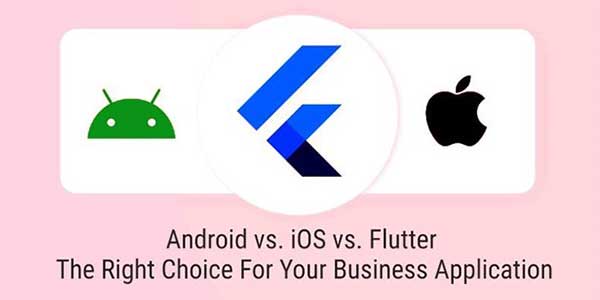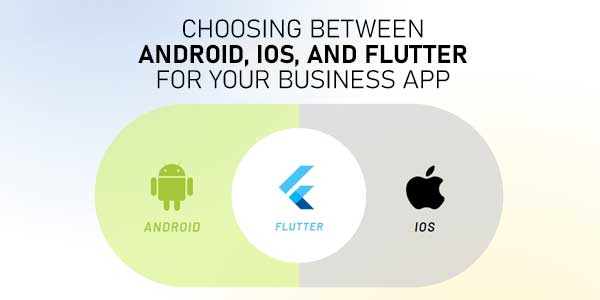
Are You Struggling To Choose The Best Platform For Your Business App? The Decision Between Android, iOS, And Flutter Can Be Challenging. This Blog Provides A Comprehensive Guide, Addressing Key Factors Such As Target Audience, Budget, And Platform-Specific Considerations, To Help You Make An Informed Choice And Set Your App On The Path To Success.
Businesses face a pivotal decision when developing a new mobile app: embrace the native route or take the cross-platform path. This choice carries hefty implications that can make or break an app’s success. On one hand, developing an app native to Android or iOS devices promises unrivaled speed and seamless integration with each operating system’s full capabilities. On the other, cross-platform development using a framework like Flutter offers enticing benefits like cost-effective development and the flexibility to incorporate native features.
Sadly, there is no one-size-fits-all answer; each option has its own set of advantages and considerations; it all hinges on your project’s specific goals. To help you discern just what is best for your mobile app development endeavor, we’ve listed the advantages and drawbacks of each platform to help you choose the right one for your business app.
Table of Contents
Android: The Open-Source Ecosystem:
Android, developed by Google, reigns as the most widely used mobile operating system globally. Its open-source ecosystem, flexibility, and vast user base make it a compelling choice for businesses looking to reach a broad audience. Here’s a detailed look at the key considerations when choosing Android for your business app:
Advantages Of Developing For Android:
1.) Market Share And Audience:
The undeniable strength of Android lies in its massive user base. Android is likely the better choice if your target audience spans a diverse range of demographics and you’re aiming for quantity. With over 3.6 billion active Android users in 2023 [ ], your app can potentially reach a wide and varied audience.
2.) Customization:
Android’s open nature allows for extensive customization. Developers have more flexibility in terms of app design, functionality, and user experience.
3.) Development Tools:
Android Studio is a robust development environment with an array of tools and support for multiple programming languages, including Java and Kotlin. The flexibility of languages allows businesses to utilize their existing resources effectively.
4.) App Distribution:
Android apps can be distributed through various app stores, not limited to Google Play. This provides businesses with more options and greater control over their app’s distribution, which can be valuable for targeted marketing strategies.
5.) Monetization Opportunities:
Ad-supported and freemium models are more common on Android, offering more diverse opportunities for revenue generation. This is especially advantageous for businesses planning to monetize their apps through advertising or in-app purchases.
Limitations Of Developing For Android:
1.) Fragmentation:
One of the primary challenges of Android development is the high level of fragmentation. The Android ecosystem comprises various device manufacturers and operating system versions, making it complex to ensure a consistent user experience across all devices. Developers must account for different screen sizes, resolutions, and hardware capabilities, which can increase development complexity.
2.) Security Concerns:
Android is often considered to be less secure compared to iOS. For business apps handling sensitive data, this security concern can be a significant drawback as any security breaches can result in data leaks and a loss of user trust.
3.) App Store Variability:
While the flexibility of app distribution on Android can be an advantage, it can also result in varying levels of app quality and security in third-party app stores. This variability can pose risks to user security and privacy.
4.) Development Complexity:
The diversity of Android devices means that developers must put in extra effort to ensure that their apps work seamlessly across various screen sizes and hardware configurations. This can lead to increased development time and cost.
5.) User Engagement:
Android users tend to be less willing to pay for apps compared to iOS users. This can impact revenue generation for businesses relying on paid app models.
iOS: The Premium Mobile App Ecosystem:
iOS, developed by Apple, may have a smaller market share compared to Android, but it’s known for its premium user experience, stringent ecosystem control, and engaged user base. Here’s a detailed look at what iOS has to offer for your business app:
Advantages Of Developing For iOS:
1.) Unified Ecosystem:
iOS development is known for its highly unified ecosystem. Apple maintains strict control over both hardware and software, resulting in a limited number of device variations. This makes it easier for developers to ensure consistency and maintain high-quality app performance.
2.) High-Quality User Experience:
Apple places a strong emphasis on user experience and design. iOS apps are often regarded as more polished and user-friendly, which is crucial for business apps aiming to make a positive impression on users.
3.) Security And Privacy:
Apple is renowned for its rigorous security and privacy measures. For business apps dealing with sensitive data, this level of security is a vital trust-building factor for users.
4.) Monetization Opportunities:
iOS users are generally more willing to pay for apps. This can lead to better monetization options, and the Apple App Store is known for generating higher revenue for developers.
5.) Development Tools:
Apple provides a suite of development tools, with Xcode being the primary integrated development environment (IDE). Xcode is praised for its user-friendliness and robust debugging capabilities. Developers can build iOS apps using Swift or Objective-C.
6.) Timely Updates:
iOS devices receive timely software updates, allowing your app to leverage the latest features and security enhancements. This ensures that your business app stays competitive in the ever-evolving tech landscape.
Limitations Of Developing For iOS:
1.) Cost:
Developing and maintaining iOS apps can be more expensive compared to other platforms. This is due to the need for Mac hardware, Apple Developer Programme fees, and the rigorous review process. These costs can be a significant factor for smaller businesses.
2.) Market Share:
While iOS devices have a strong presence in developed markets, their global market share is smaller compared to Android. The choice of iOS might limit your app’s reach, depending on your target audience and geographical focus.
3.) App Store Guidelines:
Apple enforces strict App Store guidelines, which, while ensuring app quality, can also lead to app rejections or delays in getting your app published. Navigating these guidelines can sometimes be challenging.
4.) Customization:
Apple’s guidelines may restrict the extent of customization you can achieve in your app’s design and functionality. This can be a limitation for businesses with unique branding or user experience requirements.
Flutter: The Cross-Platform Solution:
Google’s Flutter presents an alternative method for creating mobile apps. It’s a cross-platform framework [ ] that allows you to write a single codebase and run it on both Android and iOS. Here’s a closer look at Flutter and its suitability for your business app:
Advantages Of Developing With Flutter:
1.) Cross-Platform Development:
Google created the open-source UI framework Flutter, which enables developers to produce natively compiled applications for mobile, web, and desktop from a single codebase. This drastically reduces development time and cost, as it eliminates the need for separate iOS and Android development.
2.) Hot Reload:
Flutter offers the “hot reload” feature, enabling developers to see the real-time effects of code changes during development. This significantly speeds up the development process, making it highly efficient.
3.) Consistency:
Flutter ensures a consistent and polished look across both Android and iOS platforms. This is a significant advantage for businesses aiming to maintain a unified brand experience and user interface.
4.) Rich UI Components:
Flutter provides a rich set of customizable UI components, making it easier to create beautiful and interactive user interfaces. This can be a valuable asset for businesses looking to create visually appealing and user-friendly apps.
5.) Community Support:
The Flutter community is growing rapidly, and developers can access a wide range of packages and plugins to extend functionality. This robust community support can help businesses quickly address issues and expand their app’s features.
6.) Performance:
Flutter apps are known for their high performance and speed. They compile into native code, resulting in apps that run smoothly and respond quickly to user interactions.
Limitations Of Developing With Flutter:
1.) Learning Curve:
While the Dart programming language used in Flutter is relatively easy to learn, the framework itself may have a learning curve for developers who are not familiar with it. This initial learning period can affect development timelines.
2.) Third-Party Integrations:
While Flutter has a growing library of packages, there may be limitations in third-party integrations compared to using native development tools. Businesses relying heavily on specific third-party services may need to invest additional time and effort in integration.
3.) Size Of Apps:
Flutter apps tend to be larger compared to native apps. This can be a concern for users with limited storage space on their devices. However, as technology advances, this issue may become less significant.
4.) Limited Native Features:
Some native features and capabilities may be more challenging to implement in Flutter apps compared to platform-specific development. While Flutter is continually evolving, there may be some features that are not as readily

Android vs. iOS vs. Flutter: Tackling The Dilemma:
Now that we’ve explored the strengths and considerations of Android, iOS, and Flutter in-depth, let’s consider some key factors on which the right platform for your business app hinges.
Target Audience:
Consider the demographics and preferences of your target audience. If you aim to reach a broad and diverse user base, Android may be the better choice. On the other hand, if you’re targeting a premium customer base willing to pay for quality services, iOS could be more appealing. Flutter, with its cross-platform capabilities, can be a viable choice to reach both markets efficiently.
Budget And Timeframe:
Evaluate your budget and project timeline. If you have limited resources and need to develop your app quickly, Flutter’s cross-platform approach can save you time and money. Native development, while robust, typically requires separate development for Android and iOS, which can be more time-consuming.
App Complexity:
Highly specialized or resource-intensive apps may require the performance and optimization available through native development. Evaluate the specific features and requirements of your app to determine the most suitable platform.
Security And Compliance:
If your app handles sensitive data or must comply with specific regulations, evaluate the security features of each platform. iOS is often favored for its stringent security measures. Flutter offers strong security and allows for consistent security management across both Android and iOS platforms, providing a more streamlined approach.
Revenue Share And Monetization:
Assess the revenue share model of each platform. Android and iOS have different commission structures for app sales and in-app purchases. Consider how these commissions impact your revenue and profitability. Flutter, being an open-source framework, may offer more flexibility in monetization strategies, allowing you to adapt your approach to your specific business needs.
The Role Of Mobile App Developers In Android, Ios, And Flutter Development:
When embarking on the journey of Android, iOS, or Flutter app development, it’s essential to acknowledge that the choice of the development platform is just one part of the equation. Equally critical is assembling a competent development team.
If your team already comprises app developers proficient in Android, iOS, and Flutter development then you’re in a good position to consider in-house app development. However, if you do not have a professional app developer on your team, then it’s imperative to hire mobile app developers. You can also collaborate with a third-party vendor if you wish for proper monitoring and management of the project and need experts to work on it without the stress of recruitment and project management. Hiring an Android or iOS app development company that’s well-versed in developing apps for your chosen platform and can scale their solutions according to your requirements will help you in the long run, in terms of outcome, time, and cost efficiency.
Wrap Up:
Whether targeting a broad user base, a premium audience or looking for cost-effective cross-platform development, make an informed decision that aligns with your goals. Remember that successful app development extends beyond platform choice; factors like development quality, user engagement, and effective marketing play a significant role in your app’s success. With careful planning and execution, you can create a successful business app.

 About the Author:
About the Author:












Be the first to write a comment.